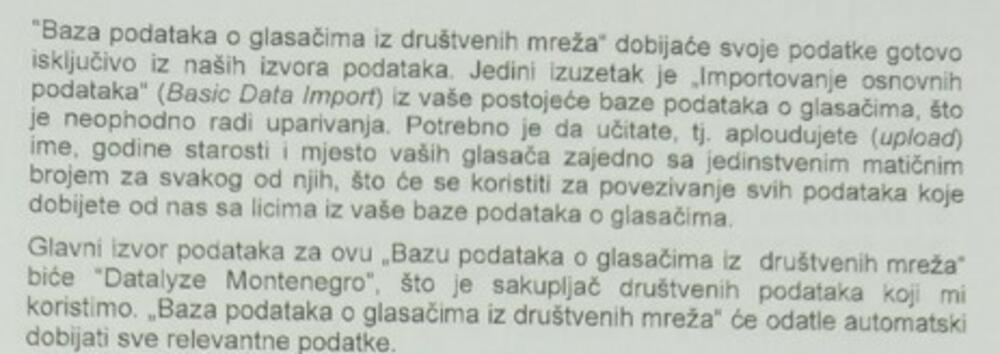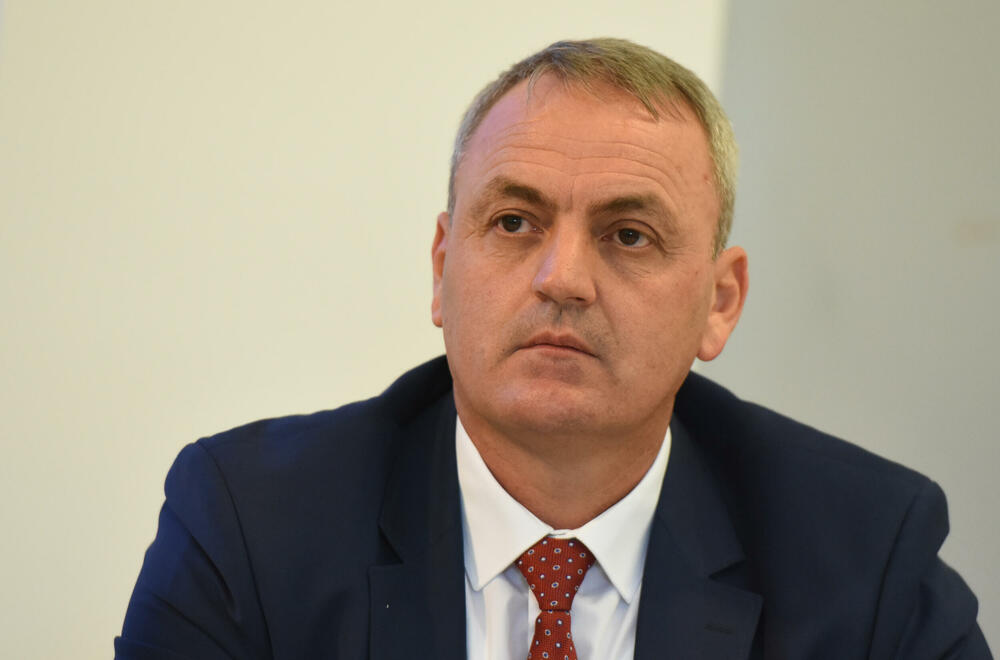The Democratic Party of Socialists (DPS) purchased software that matched citizens' social security numbers with their social media profiles or online data in order to influence their political views during the 2018 presidential election campaign.
"Vijesti" is in possession of extensive documentation that state auditors seized during the financial control of the party in 2019, which testifies to the contract with the Hungarian company "Big data analytics" for the procurement of software, which in the test phase enabled them to recognize and influence political the views of about 40.000 citizens...
The State Audit Institution (DRI), as officially announced to "Vijesti", informed the competent Agency for Personal Data Protection (AZLP) about this.
That institution, however, did not control the then-ruling DPS and the possible misuse of personal data - social security numbers of thousands of citizens.

In their response to the editors, they refer to the institution's opinion from 2015, according to which the Personal Data Protection Act "does not apply to the processing of personal data by Facebook INC, so the Agency is not competent to interpret and apply foreign legislation...".
The then strongest ruling party, as they write in their internal correspondence, states that they successfully tested the software in the 2018 presidential campaign, on 40.000 citizens.
Then their candidate won the election Milo Djukanovic.
DPS did not answer the questions of "Vijesti".
DIG DEEP…
DPS, as the client of the work, signed a contract with the Hungarian company "Big data analytics" from Budapest. The subject is "creation and installation of software for the database of voters from social networks (Social Voter Database)", "providing consulting services to the client so that he can apply this software and start using it properly". The contract is worth at least 60.000 euros.
The Hungarian company also committed to "submitting the data described in Annex I based on available information about voters from their activities on social media."
According to that document, which "Vijesti" has access to, the system will be built around the "Social Voters Database".
"It will be a central hub that will contain all the data we can collect about voters. The database of voters from social networks will represent your widest access to our database, where we provide the possibility to export all our data to your own systems", it is stated, among other things, in the description of the project that "Big data analytics" offered to DPS through contract.
At the same time, she asked that party to provide them with the name, age, place and voter registration numbers.
“The social media voter database will get its data almost exclusively from our data sources. The only exception is the import of basic data (Basic data import) from your existing voter database, which is necessary for matching. You need to upload the name, age, location of your voters with a unique ID number for each of them, which will be used to connect all the data you receive from us with people from your voter database. the offer is from a Hungarian company, which DPS accepted.
The Hungarian firm contractually guaranteed that the results ("scores") on two levels "will represent exactly what you want".
"First of all, you will edit or modify scores on the 'Score Editing Interface'. This allows you to select posts and pages, as well as to define their weight, i.e. importance in building scores... Another guarantee is your access to individual scores in the module "Profiles of individual voters on multiple levels", where you can dig deep and get all the information which are in the database of individual voters...You will be able to search for individuals by name, you will have access to specific posts and interactions...", the contract states.
"Vijesti" was not able to reach the contact of the company or persons in "Big data analytics".
"WE TESTED ABOUT 40.000 PEOPLE"
According to the documentation, the IT sector of the DPS reported to the business director of that party that "the conditions from the contract with the Hungarian company 'Big data analytics', which refer to the payment of the second invoice, have been fully met."
"Everything that was foreseen in the second phase of the contract was realized. The delays that occurred were caused by factors that we were not able to influence directly, neither we nor the company 'Big data analytics', but were caused by changes on Facebook. That company, faced with the Cambridge Analytica scandal and allegations of misuse of private data, introduced new rules and restrictions, due to which 'Big Data' and we were forced to look for alternative data collection systems," the official's memo states. from May 3, 2019.
He specifies in the letter that "the test phase of the new system has been successfully completed".
"For the presidential elections, we managed to get an estimate for about 40.000 people. In the following period, work on improving the system continues and the implementation of the next phase of the contract is underway. Please, based on the contract, pay invoice 2, in the amount of 21.000 euros...", the letter states.
Cambridge Analytica, a data analytics firm, worked with the election team Donald Trump in 2016 and the winning Brexit campaign, she harvested data from millions of American voter profiles from Facebook, in one of the tech giant's biggest data breaches, and used it to build a powerful software program to predict and influence elections.
The firm used personal data taken without authorization in early 2014 to build a system that could profile individual voters in order to target them with personalized political ads.
In December 2022, Meta, Facebook's parent company, agreed to pay $725 million to settle a class-action lawsuit alleging that it allowed Cambridge Analytica and other third parties to access users' private information and misled users about its practices. of privacy.
2018.
The software was tested for the first time, as claimed by the Democratic Party of Socialists. This was done, he writes, in response to the presidential elections in which Milo Đukanović won. DPS informs in a letter that they "tested" about 40.000 citizens
AZLP IGNORES REGISTRATION NUMBERS, FACEBOOK OUT OF REACH
The state auditor informed the competent board of the SAI by email about potential suspicions about the misuse of voter registration numbers through the use of information technologies, "News" from the supreme audit responded.
The collegium of the SAI tasked that state auditor to "inform the Agency for the Protection of Personal Data and Free Access to Information about his suspicions, for the reason that the State Audit Institution is not competent in the field of personal data protection".
"According to the Conclusion of the competent Collegium, the state auditor duly informed the Agency for the Protection of Personal Data and Free Access to Information by letter and submitted the relevant documentation collected during the audit process. As the Agency for the Protection of Personal Data and Free Access to Information is authorized to carry out tasks established by the Law on the Protection of Personal Data, and in order to obtain complete information, we suggest that you directly request an answer from the Agency", the SAI replied.
AZLP ignored the question regarding the possible misuse of citizen's registration numbers and claim that they made an opinion in 2015 and published it on the website.
"In this regard, the processing of personal data by Facebook Inc. the provisions in terms of Article 5 of the Law on the Protection of Personal Data (territorial validity of the law) do not apply, so in that sense the Agency is not competent to interpret the application of foreign legislation, but in accordance with its competence it is obliged to give an interpretation in connection with the prescribed positive legislation in Montenegro in relation to the processing of the identity card related to the specific issue raised by the request in question. After its adoption, the relevant opinion was published on the Agency's website, and thus made available to the public, so there was no need to establish a new Opinion on the same or a similar subject matter when it comes to the processing of data that is publicly available on social networks. it is stated in the answer signed by a member of the AZLP Council Muhammad Gjokaj.

He points out that the state auditor requested the opinion of the Agency in the letter in question regarding the processing of data on social networks, for which there is already a position of the Council.
"Hereby, I would like to inform you that it is also the position of the Council that when it comes to the same legal matter, the opinion is either delivered to the party or published on the website, which was actually done. Bearing in mind the above, according to the act in question, the Agency did not have the authority to act, that is, to implement the monitoring procedure on social networks, nor was it required to do so, but rather it was a request for giving an opinion, because it was not about a specific violation or specific data of certain physical person, which could be seen from the attached documentation...", claims Gjokaj.
DPS is silent about the potential violation of the right to privacy
And DPS ignored the questions of "Vijesti".
They did not answer the questions when they signed the contract with the Hungarian company "Big data analytics", what is the subject of that contract and how long they were in a contractual relationship with that company.
Unanswered are the questions related to the project of the Hungarian company for DPS, the specification and performance of the software, the data it matched, during which election cycles...
They did not answer whether the data of Montenegrin voters went outside of Montenegro and whether DPS thereby violated the right to privacy of voters.
For the presidential elections, we managed to obtain estimates for about 40.000 people. In the following period, work on improving the system continues and the implementation of the next phase of the contract is underway. Please, based on the contract, pay invoice 2, in the amount of 21.000 euros...", it is stated in the internal correspondence of DPS
In their mutual correspondence, the DPS states that due to the scandal known as "Cambridge Analytics", they had to look for alternative methods of data collection with Hungarian business partners
Bonus video:





